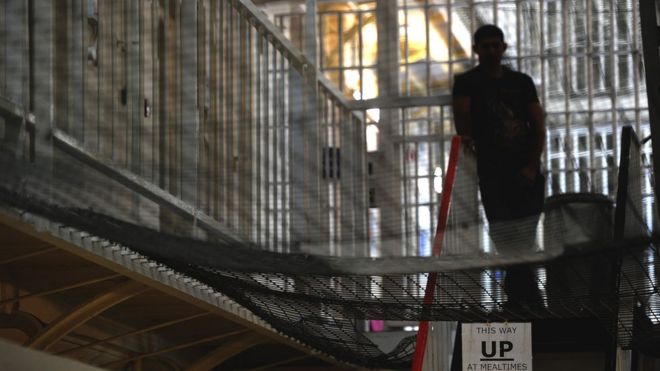Prison Service finds 225kg of drugs in one year

Prison officers confiscated about 225kg (496lbs) of drugs in one year, according to the Ministry of Justice.
In 2016 20,000 mobile phones and sim cards, which are also contraband, were also seized from prisoners. The haul comes after £2 million investment in mobile phone detectors across the service, as well as 300 specialist dogs for drug detection.
Prisons minister Sam Gyimah said that the amount of drugs and phones in prisons is "unacceptable".
He said: "I have been clear that the current levels of violence, drugs and mobile phones in our prisons is unacceptable.
"These figures highlight the determination of prison staff to disrupt this behaviour."
Illegal mobile phones are used by some prisoners to continue their criminal activity, and can be rented for up to £1,000.
A spokesman for the Ministry of Justice added that the Prisons Service was working to curb the use of drones in delivering phones and drugs, by creating "a specialist squad of prison and police officers".
Former prisoner Alex Cavendish, who was released in March 2014, said the contraband haul was the "tip of the iceberg".
He told BBC Radio 5 live that cuts to staffing budgets and "corrupt" prison officers were to blame, adding: "It's really proving a struggle to keep these things out of prisons.
"There's only really one explanation and that is, I'm afraid, that corrupt staff - and that includes uniformed and civilian staff - are bringing them in through the staff entrance," he said.
But director of the Prison Reform Trust, Peter Dawson, said that mobile phones in prison were not necessarily a bad thing as they helped people "cope with the experience" and prepare for release.
"It's in all our interests that people retain their family ties and the phone is an obvious way of doing that," he said.
Mr Dawson said it was "pointless" to track down inmates who used a mobile to "call their mum" rather than for criminal purposes.
Media captionUndercover footage shows prisoners incapacitat
"It needs addressing fundamentally by recruitment and retention of prison officers," he told BBC One's Breakfast, adding: "New prison officers may be compromised by threats, they may be taken in by financial gain, which is not acceptable and my union doesn't defend those people."
In February, a reporter from BBC's Panorama programme went undercover at HMP Northumberland, where he found a number of inmates incapacitated from taking the drug spice.
In 2016, more than 45% of prisoners in a survey conducted by the HM Inspectorate of Prisons said it was easy to get drugs behind bars.
Mr Gyimah said that the ministry was continuing to employ more prison officers in England and Wales to help tackle the problem. It is hoped there will be an extra 2,500 members of staff by 2018.
He added: "The issues within our prisons will not be resolved overnight, but we must make progress in tackling these problems."
The department began rolling out tests for psychoactive substances at prisons in September 2016, in a bid to curb the drugs problem across correctional facilities in England and Wales.
It is also working with mobile network operators to develop ways of blocking mobile phone signals in prisons.



Comments
Post a Comment